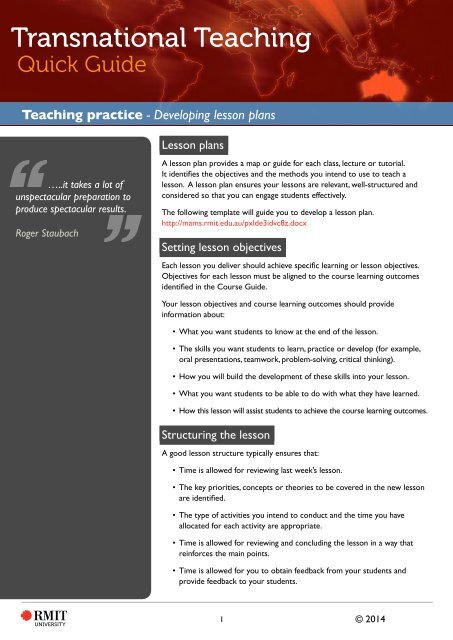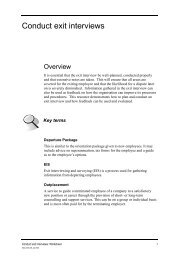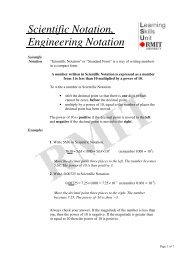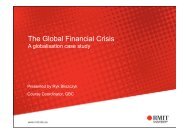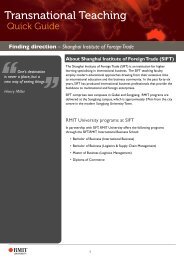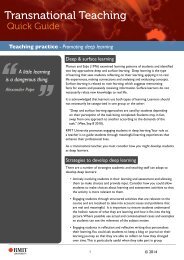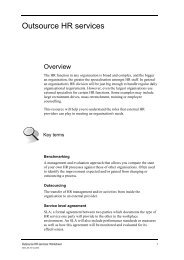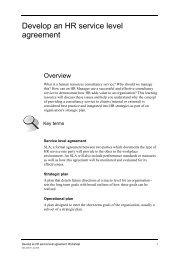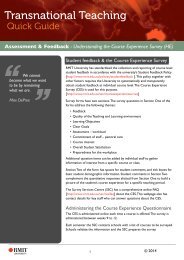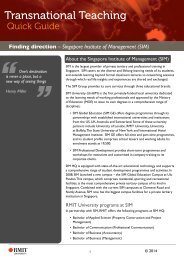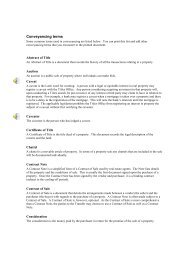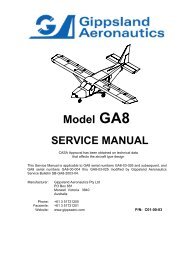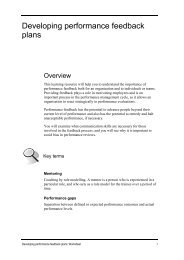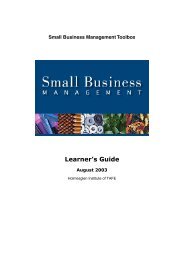Developing lesson plans - RMIT University
Developing lesson plans - RMIT University
Developing lesson plans - RMIT University
Create successful ePaper yourself
Turn your PDF publications into a flip-book with our unique Google optimized e-Paper software.
Transnational Teaching<br />
Quick Guide<br />
Teaching practice - <strong>Developing</strong> <strong>lesson</strong> <strong>plans</strong><br />
Lesson <strong>plans</strong><br />
…..it takes a lot of<br />
unspectacular preparation to<br />
produce spectacular results.<br />
Roger Staubach<br />
A <strong>lesson</strong> plan provides a map or guide for each class, lecture or tutorial.<br />
It identifies the objectives and the methods you intend to use to teach a<br />
<strong>lesson</strong>. A <strong>lesson</strong> plan ensures your <strong>lesson</strong>s are relevant, well-structured and<br />
considered so that you can engage students effectively.<br />
The following template will guide you to develop a <strong>lesson</strong> plan.<br />
http://mams.rmit.edu.au/pxlde3idvc8z.docx<br />
Setting <strong>lesson</strong> objectives<br />
Each <strong>lesson</strong> you deliver should achieve specific learning or <strong>lesson</strong> objectives.<br />
Objectives for each <strong>lesson</strong> must be aligned to the course learning outcomes<br />
identified in the Course Guide.<br />
Your <strong>lesson</strong> objectives and course learning outcomes should provide<br />
information about:<br />
• What you want students to know at the end of the <strong>lesson</strong>.<br />
• The skills you want students to learn, practice or develop (for example,<br />
oral presentations, teamwork, problem-solving, critical thinking).<br />
• How you will build the development of these skills into your <strong>lesson</strong>.<br />
• What you want students to be able to do with what they have learned.<br />
• How this <strong>lesson</strong> will assist students to achieve the course learning outcomes.<br />
Structuring the <strong>lesson</strong><br />
A good <strong>lesson</strong> structure typically ensures that:<br />
• Time is allowed for reviewing last week’s <strong>lesson</strong>.<br />
• The key priorities, concepts or theories to be covered in the new <strong>lesson</strong><br />
are identified.<br />
• The type of activities you intend to conduct and the time you have<br />
allocated for each activity are appropriate.<br />
• Time is allowed for reviewing and concluding the <strong>lesson</strong> in a way that<br />
reinforces the main points.<br />
• Time is allowed for you to obtain feedback from your students and<br />
provide feedback to your students.<br />
1 © 2014
Preparing <strong>lesson</strong> content<br />
Academic and teaching staff should tailor each <strong>lesson</strong> to ensure the content is<br />
relevant to:<br />
• The characteristics of the student cohort and their learning styles<br />
• The local contexts of transnational students<br />
• Contemporary industry practice<br />
Lesson content should align coherently and logically with the content you<br />
intend to cover in the course.<br />
Engaging, practical and contextualised examples and cases should support an<br />
internationalised curriculum, be relevant to student contexts and be up-to-date<br />
or historically relevant.<br />
Audiovisual supports, handouts and online resources should be thoughtfully<br />
selected so that they are relevant and clearly support student learning.<br />
Consider preparing additional material that can be used if for some reason<br />
your planned activities do not consume the time allowed or an activity cannot<br />
be conducted.<br />
Academic and teaching staff must have a good knowledge and understanding of<br />
the concepts and theories to be covered in the <strong>lesson</strong>. This includes ensuring<br />
you can answer the tutorial questions that your students are expected to<br />
answer<br />
Reviewing the effectiveness of your <strong>lesson</strong> plan<br />
It is important to take time each week to reflect on and review your teaching<br />
practice and the effectiveness of the <strong>lesson</strong>s you have planned and presented.<br />
Consider the following questions:<br />
• What did I do that worked well?<br />
• What did not work well? Why not?<br />
• How well did I involve the students in active participation?<br />
• Did the timing of each activity go to plan? Did I get through all that I had<br />
planned?<br />
• What could I improve for the next <strong>lesson</strong>?<br />
• Do I need to find more resources to support my teaching?<br />
• Do I need to seek additional support to help my students with any<br />
learning challenges?<br />
2 © © 2014
Useful resources<br />
Support is available from your Deputy Head of School (Learning & Teaching) or<br />
equivalent. Your College Academic Development Group or learning & teaching<br />
specialist can also provide advice, support and professional development.<br />
<strong>RMIT</strong> <strong>University</strong>’s practical guides to teaching will help your plan and improve<br />
your teaching practice:<br />
http://www.rmit.edu.au/teaching/practical<br />
Planning your classes — <strong>RMIT</strong> <strong>University</strong><br />
http://www.rmit.edu.au/browse;ID=an6p46dgm7vc<br />
Inclusive Teaching — <strong>RMIT</strong> <strong>University</strong><br />
http://www.rmit.edu.au/teaching/inclusive<br />
Preparing a <strong>lesson</strong> plan — Honolulu Community College<br />
http://honolulu.hawaii.edu/intranet/committees/FacDevCom/guidebk/teachtip/<br />
teachtip.htm#<strong>lesson</strong>plan<br />
Writing <strong>lesson</strong> <strong>plans</strong> — Huntington <strong>University</strong><br />
http://www.huntington.edu/education/<strong>lesson</strong>planning/Plans.html<br />
Introduction to Planning a Class Session — Penn State <strong>University</strong><br />
http://serc.carleton.edu/files/NAGTWorkshops/careerprep/teaching/<strong>lesson</strong>_<br />
planner.pdf<br />
Course planning — <strong>University</strong> of the Sciences in Philadelphia<br />
http://www.usciences.edu/teaching/tips/planning.shtml<br />
Good Practice Principles: Learning and Teaching Across Cultures — the Office<br />
for Learning and Teaching, Australian Government<br />
http://www.ieaa.org.au/resources/learning-teaching-across-cultures<br />
3 © © 2014


